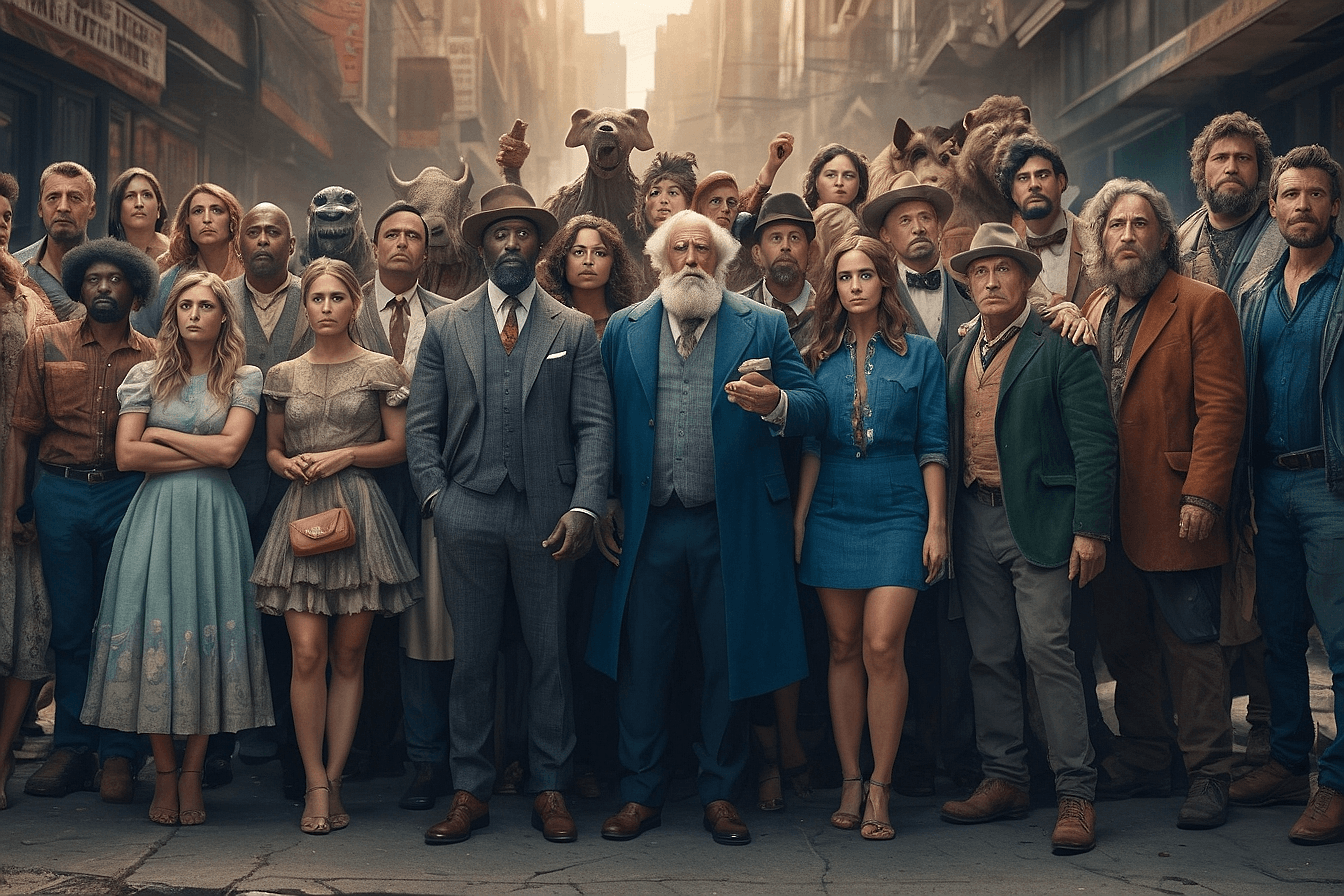Curious about the least liked personality type? Dive into this exploration to uncover insights on the subject. Understanding how historical context shapes perceptions of different personalities can shed light on societal preferences. Discover more about this intriguing topic and gain a fresh perspective on personality types.
Key Takeaways
Understand the societal stereotypes surrounding least liked personality types to navigate biases effectively.
Overcome misconceptions by breaking negative perceptions through education and awareness.
Provide support and strategies for disliked types to cope with criticism and stigma.
Embrace positive insights for unpopular types to promote self-acceptance and confidence.
Take actionable steps to challenge and change the narratives associated with the least liked personality types.
By addressing and debunking misconceptions, individuals can foster a more inclusive and understanding environment for all personality types.
Unveiling Least Liked Types

Resistance Change
Resistance to change is a common trait among the least liked personality types in team dynamics. These individuals often struggle with adapting to new processes or methods, leading to friction within the team. Their reluctance to embrace change can hinder progress and innovation.
Embracing change is crucial for team collaboration as it allows for growth and development. Team members who resist change may create roadblocks that impede the team’s ability to achieve its goals. Their unwillingness to adapt can result in missed opportunities and decreased productivity.
Aversion Technologies
Aversion to new technologies is another characteristic that can make a personality type less liked in a team setting. Individuals who shy away from embracing technological advancements may be perceived as outdated or resistant to improvement. This aversion can divide tech-savvy team members and those who are not.
Technology is vital in enhancing efficiency and streamlining processes in today’s digital age. Team collaboration relies heavily on technological tools, and individuals who avoid using them may hinder the team’s overall performance. Embracing new technologies can lead to better communication, organization, and workflow optimization.
Manual Work Preference
Preference for manual work over automation can contribute to someone being seen as the least liked personality type within a team. Individuals who prefer traditional methods over automated solutions may be viewed as resistant to efficiency and progress. Their reliance on manual work can slow down processes and limit productivity.
Automation has become essential in modern workplaces, enabling teams to work more efficiently and effectively. Individuals who favor manual work may struggle to keep up with the pace of automation-driven tasks, leading to delays and inefficiencies within the team. Embracing automation can streamline workflows, reduce errors, and improve overall output.
Societal Stereotypes Explained

Misconceptions and Judgments
Societal norms often lead to misconceptions about individuals who resist using tools like Asana for task management. People may assume that those who prefer different methods are inefficient or disorganized. These biases can create judgment towards individuals with alternative ways of managing tasks.
Perceptions and Preferences
Individuals who favor scattered information over centralized systems may face scrutiny due to society’s expectations. The preference for a more flexible approach in organizing tasks can be misunderstood as a lack of structure or discipline. This can impact how these individuals are perceived by others, affecting their professional relationships.
Impact on Reputation
The reluctance of some individuals to adopt new tools for efficiency can be influenced by societal stereotypes. Society often values adaptability and quick adoption of technology. Those who choose not to conform to these standards may face criticism and have their reputation tarnished as resistant to change. This can hinder career growth and opportunities for these individuals.
Unpopularity of Specific Types

Traits Influence
Certain personality types face significant resistance to embracing new technologies, particularly project management tools. This reluctance stems from specific traits that these individuals possess.
Individuals who hate or are averse to automation are often labeled as the least liked within professional settings. Their resistance to change and reliance on traditional methods can hinder team efficiency.
Perceptions and Challenges
The anomaly in this scenario is the negative perception these individuals receive due to their reluctance to adopt modern tools like Asana Rules for task optimization. Colleagues may view them as hindrances to progress.
These individuals struggle with adapting to new technologies and face challenges in collaborating effectively with team members who rely heavily on digital tools. The clash between traditional and modern work approaches can lead to friction within teams.
Navigating Societal Biases

Understanding Perceptions
Social norms often dictate our views on personality types, leading to biases against those perceived as sensitive or compassionate individuals. These biases can affect how these individuals are valued in various community settings.
Challenging these biases involves promoting empathy and recognizing the value of different traits in a diverse world. By acknowledging and appreciating the strengths of emotional and caring individuals, we can work towards creating a more inclusive society.
Strategies for Change
To combat negative biases, fostering open discussions and promoting education on the importance of diverse personalities is essential. Encouraging acceptance of all personality types can lead to a more supportive environment for everyone.
Foster empathy through open communication
Promote education on diverse personalities
Encourage acceptance of all traits
Impact on Teamwork
Individual biases can significantly impact teamwork and collaboration within organizations. When certain personality types are undervalued or stigmatized, it can create divisions and hinder effective communication among team members.
Reduced team cohesion
Impaired communication
Hindered collaboration
Overcoming Misconceptions

Embracing Change
Change is inevitable in both personal and professional settings. Embracing new technologies and processes can lead to significant growth opportunities. Adapting allows individuals to stay relevant in a rapidly evolving world.
In the workplace, being open to change fosters innovation and efficiency. Resisting new tools or methods due to misconceptions can hinder progress. By embracing change, individuals can enhance their skill sets and contribute more effectively to team projects.
Improved Team Dynamics
Overcoming misconceptions about unfamiliar tools or technologies is crucial for fostering team collaboration. When team members are willing to learn and adapt, it creates a positive environment where knowledge-sharing thrives. This, in turn, leads to improved team dynamics and better project outcomes.
Strategies for Disliked Types

Open-mindedness
Embrace feedback and be willing to change behaviors based on constructive criticism. Adapt to different work styles to improve collaboration within the team.
Maintaining an open mind is crucial for individuals who are considered the least liked personality type. By graciously accepting feedback, one can identify areas for improvement and work towards enhancing one’s reputation within the team. Flexibility in adapting to various communication styles and task management tools like Asana can significantly boost productivity and teamwork.
Communication Enhancement
Listen actively to colleagues’ perspectives and express ideas clearly and concisely. Seek clarification when needed to avoid misunderstandings.
Effective communication is pivotal in reshaping how others perceive disliked personality types. Listening to team members’ opinions fosters a sense of inclusion and respect. Clear expression of thoughts helps avoid misinterpretations, fostering better relationships within the team dynamic. Asking for clarification when uncertain showcases a willingness to engage in meaningful dialogue.
Teamwork Improvement
Collaborate proactively, offer assistance when possible, and acknowledge others’ contributions openly. Celebrate wins together as a unified team.
Improving teamwork involves proactive collaboration and support towards team goals. Individuals perceived as the least liked can enhance their reputation by actively participating in group tasks and offering help when needed. Acknowledging teammates’ efforts publicly reinforces a positive team spirit and encourages mutual respect. Celebrating achievements collectively instills a sense of unity among team members, fostering a harmonious work environment.
Breaking Negative Perceptions
Effective Communication
Effective communication plays a crucial role in changing negative perceptions within a team. Clear and open communication helps address misunderstandings and build trust among team members. By actively listening to each other’s perspectives, individuals can better understand different personality types.
Successful teams often implement regular team meetings where members can openly discuss concerns and share feedback. Encouraging open dialogue allows team members to express their thoughts and feelings, fostering a more inclusive environment. Through effective communication channels, teams can work towards breaking negative stereotypes and promoting collaboration.
Strategies for Change
Implementing team-building activities can help individuals with resistant personalities feel more comfortable within the team dynamic. Group projects or social events allow team members to interact in a non-work setting, fostering stronger relationships.
Mentorship programs offer valuable support for individuals struggling with change. Pairing them with experienced team members who can provide guidance and encouragement can help alleviate fears associated with new situations. Organizations demonstrate their commitment to supporting all team members by offering mentorship opportunities.
Building Positive Relationships
Creating a culture of acceptance and understanding is essential for breaking negative stereotypes associated with certain personality types. Team leaders are vital in promoting inclusivity by setting an example through their actions and words. Encouraging empathy and respect among team members cultivates an environment where everyone feels valued.
Recognizing individual strengths within the team contributes to building positive relationships. By highlighting each member’s unique skills and contributions, teams can foster a sense of appreciation and unity. Celebrating achievements collectively reinforces the idea that everyone plays a valuable role in the team’s success.
Coping with Criticism Stigma
Self-Awareness
Self-awareness is key when dealing with criticism and the stigma associated with being the least liked personality type. Recognizing your strengths and weaknesses can help you understand feedback better.
Understanding personal development is crucial in overcoming criticism. Continuously working on yourself can help you grow and improve, making it easier to handle negative comments.
Building Resilience
To build resilience, focus on developing a growth mindset. Embrace challenges as opportunities for growth rather than setbacks. This shift in perspective can help you bounce back from criticism stronger.
Practice self-compassion to counteract negative self-talk. Treat yourself with kindness and understanding, especially when facing harsh feedback. This can help you maintain a positive attitude despite criticism.
Maintaining Positivity
Surround yourself with supportive individuals who uplift and encourage you. Having a strong support system can provide comfort during challenging times and boost your confidence.
Engage in activities that bring you joy and fulfillment. Hobbies and interests can serve as outlets for stress relief and help you maintain a positive mindset amidst criticism.
Additional Tips
Practice mindfulness techniques such as deep breathing or meditation to stay grounded during criticism.
Seek feedback from trusted sources who offer constructive criticism rather than solely focusing on negativity.
Positive Insights for Unpopular Types
Unique Strengths
Polite personality types may face criticism for being overly accommodating, but their empathetic nature allows them to connect deeply with others. Despite being perceived as weak, they possess a rare ability to diffuse tense situations with grace and tact.
Embracing Uniqueness
For sensitive people, their vulnerability is often misunderstood as a flaw. However, their heightened emotional intelligence enables them to navigate complex social dynamics with finesse. By embracing their sensitivity, they can foster authentic connections and create a supportive environment for those around them.
Overcoming Challenges
In personality, individuals labeled as incompetent losers may struggle with self-doubt and external judgment. Yet, beneath the surface lies the potential for growth and resilience. These individuals often possess a creative flair and unconventional thinking that can spark innovation in unexpected ways.
Supportive Community
Within the personality type community, it’s crucial to recognize that each individual brings something valuable. While some may be quick to judge based on superficial traits, true strength lies in celebrating diversity and fostering an inclusive environment where everyone feels valued.
Personal Growth
When faced with criticism or ostracization, one must remember that one’s worth is not defined by external opinions. By focusing on personal development and honing unique strengths, individuals can carve out a niche where they thrive authentically.
Closing Thoughts
You’ve delved into why certain personality types are less favored in society. By understanding these dynamics, you can navigate biases and misconceptions more effectively. Remember, societal perceptions don’t define your worth or capabilities. Embrace your uniqueness and strengths, regardless of external judgments.
Take charge of how you perceive yourself and others. Challenge stereotypes and cultivate empathy towards different personality types. Your awareness and acceptance can contribute to a more inclusive and understanding environment. Keep exploring the intricacies of personalities, and strive to foster a culture of respect and appreciation for diverse traits.







Leave a Reply